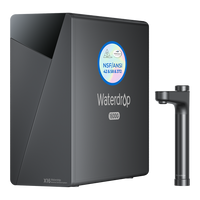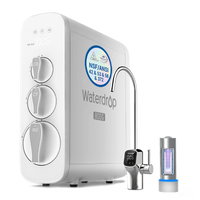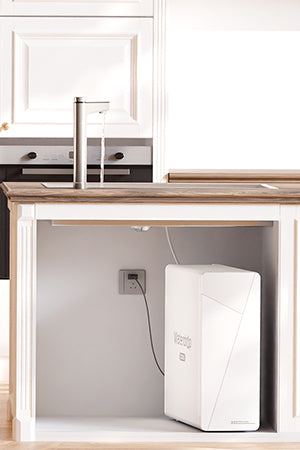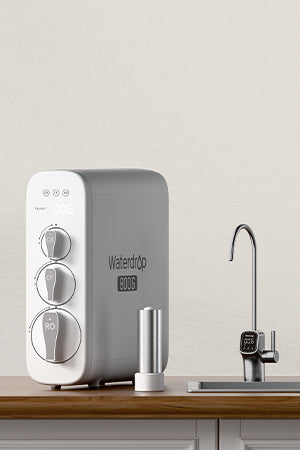Municipal water supply has been shown to contain
many contaminants, mainly from industrial and environmental sources. Knowing more about water filters and how they can help protect your family from the hazards of this contaminated municipal water.
A quick check at the current market will expose you to several types of home water purification and filtration systems. Each of these options relies on a specific purification technology to filter water. This guide discusses all of these systems and how they work.
Water Filters Explained
The role of a water filter is to serve as a physical barrier or trap for debris, bacteria, virus, and other contaminants passing through it. With the impurities out of the way, the filter leaves only safe, clean, and healthy drinking water. The water flow speed varies across filters, depending on the size of the pores in the membrane or filter barrier. The smaller the pores, the slower the water flow.
Unlike municipal tap water with a flat or irritable taste, filtered water tastes cleaner and more refreshing. The improved taste and quality of filtered water are due to the removal of contaminants from the source water. Filtered water is also advantageous to our health.
Water Filter Is Better Than Bottled Water
The question of which is better between bottled water and filtered water has been around for so long. Both options have their pros and cons. However, filtered water, or better still, buying water filters, is a better option than buying bottled water.
Here’s why you should stop drinking bottled water.
Filtered Water on Demand
There are many reasons to consider a water filter, but nothing beats the fact that it provides clean and safe drinking water whenever you want it. This removes the need for buying and stocking drinking water. Just turn on the faucet and get as much contaminant-free drinking water as you want.
Filtered Water Costs Less
Buying a water filtration system might be expensive at first. However, if you consider the long-term value, the decision can help you save money over time. Bottled water, on the other hand, costs more. You pay for every bottle you consume.
Filters Do Not Harm the Environment
The Beverage Marketing Corporation estimated the amount spent by Americans annually on bottled water to be
$16 billion. Plastic is a significant contributor to the overall environmental contamination, considering just 20% of used bottles are recycled. The unrecycled bottles return to landfills or end up as litter. In addition, America expends about 1.5 million oil barrels every year on plastic bottle production.
Water Filter Types
Choosing the right water purification solution from many options will always be a challenge. But you must get it right regardless. This section of the article will help you get the best value for money by guiding you to choose the right water filter for you and your family.
Countertop Filters
These are
point-of-use (POU) water filtration systems that you can install almost anywhere in your house. You can attach them directly to your faucet and get pure water from that source. They are usually compact, requiring smaller space and minimal plumbing connections to set up.
Countertop filters have different filtration media, but they all perform similarly. They are all designed to remove contaminants present in your source water. The filtration speed is impressive even if the household water pressure is moderate.
Undersink Filters
These are water filtration systems mounted under the kitchen sink, hence the name
under sink filters. You can connect these filters directly to your refrigerator water dispensing tap or even your kitchen tap and get clean filtered water directly from both sources. Note that these do not apply to under sink reverse osmosis filters – more on that later.
Undersink ultrafiltration membrane filters are widely used in most homes. The preference can be attributed to their impressive filtration capabilities and affordable price. They need just the regular home water pressure to deliver and consequently work without electricity. Read
What Is Ultrafiltration Membrane and How Does It Work? to learn more about ultrafiltration membrane.
There are two categories of under sink water filters – those that require connection to a tank that stores the filtered water and those that filter water on demand. The water flow in the tanked water filters is slower than in tankless models.
Installing an undersink water filter requires complex plumbing connections. You may need the services of a technician to install for the first time.
RO Systems
Osmosis is the natural movement of a weaker saline solution to a strong saline solution. Osmosis happens when plant roots absorb water from the soil and when the human kidneys absorb water from the blood.
Unlike other water filtration systems, reverse osmosis systems are more efficient at providing clean and safe water for drinking. These systems are designed to use
semi-permeable membranes to get rid of harmful contaminants in the source water.
As one of the most efficient water filtration solutions out there, RO systems can effectively remove dissolved salts and toxins in municipal tap water. Research has established their filtration efficiency to be as high as 99% in most cases. RO systems come in different forms, including the countertop reverse osmosis systems, tankless reverse osmosis systems, the whole house reverse osmosis systems, and others.
Refrigerator Filters
Refrigerator owners often get their drinking water straight from the inbuilt water dispenser. The role of a simple carbon fridge filter is to filter impurities from the drinking water coming out of the refrigerator.
Refrigerator filters are effective against chlorine, which finds its way into water during treatment as a means to improve taste and smell.
Activated carbon is a regular component of several fridge water filters. Like a magnet, the carbon attracts and traps the impurities within the filter. The filtered water is cleaner and contaminant-free.
Filters must be replaced regularly to ensure efficient performance. Filter clogging is a common occurrence, and it often limits the filter’s effectiveness. Ineffective filters can allow impurities to escape into your drinking water.
Outdoor Filters
We often need clean drinking water outdoors, especially when walking, hiking, or camping. However, outdoor water sources like rivers and lakes are not healthy for drinking, despite the water looking safe and clean. They are usually contaminated with viruses and bacteria.
There are a few ways to purify water from outdoor sources. For instance, boiling can improve purity. However, it doesn’t remove all the contaminants and can be inconvenient most times. The more convenient and efficient option is to use an
outdoor water treatment system, which comes in different types and forms.
Whole House Filters
Imagine an “integrated” water purification system capable of filtering your drinking water for the entire house right from the source. That is what whole house water filtration systems do. They are designed to filter tap water in the home to be clean and healthy enough for drinking, cooking, bathing, and washing.
Components of a whole house water purification system include a
pre-filtration system, a central water purifier, and a central water softener. There may be an extra end-water purification system if necessary. Your setup will depend mainly on your specific requirements for household water.
Final Words
Every part of the world is dealing with water pollution. While a global solution is still in the works, it is crucial to invest in a reliable water filtration solution for your immediate use. You can choose from many kinds of water filters in the current market.
Finding what works best for you can be tricky, especially for people new to the world of water filters. However, if you understand your requirements and how each type of water filter works, you are closer than ever to making the right purchase.










































































